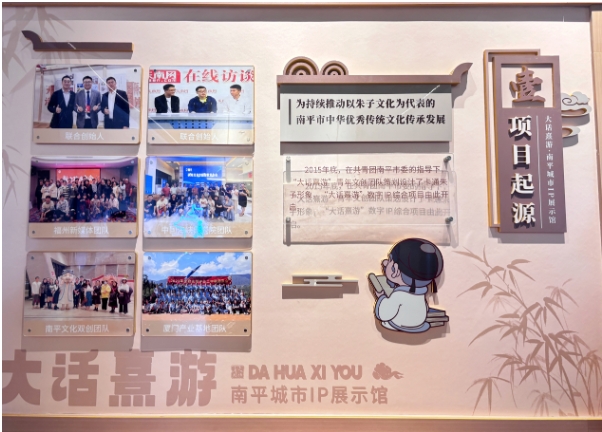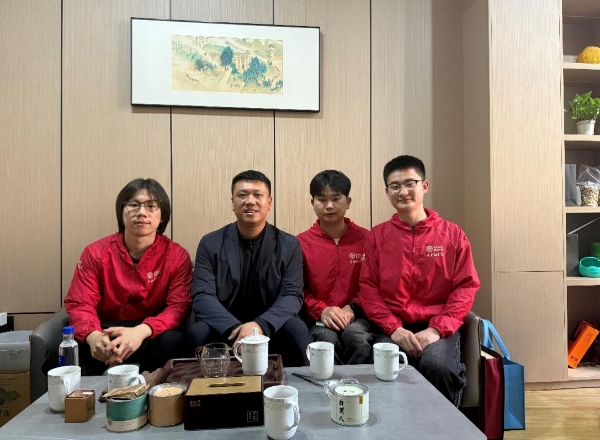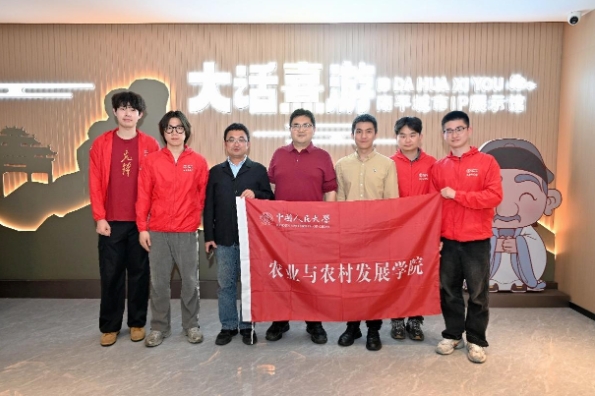
Youth Tour in Society | The “Nongfa Teahouse” Team from the School of Agricultural Economics and Rural Development Traveled to Wuyishan, Nanping, Fujian Province for Research on Rural Cultural and Creative Practice
As the Labor Day and Youth Day of 2025 approach, in order to thoroughly implement the spirit of the speech delivered by General Secretary Xi Jinping during his visit to Renmin University of China, the university has launched the campaign of the “Youth in Society” theme. The School of Agricultural Economics and Rural Development organized a practice team to participate in the pioneering project “Youth in Society: Cultural Heritage in Wuyi.”
During the “Youth Tour in Society” campaign, the “Nongfa Teahouse” team traveled to Wuyishan, Nanping, Fujian Province. Their project focused on two themes: “Promoting Cultural Visibility through IP Branding” and “Poetry of the Fields: Awakening the Gentle Memory of Villages.” Over five days, the team conducted interviews, field research, and dialogues in ancient tea villages and developed tangible cultural products that revitalize the gentle memories of rural life, infusing youthful vitality into rural revitalization efforts.
Exploring the Dahua Xiyou IP Pavilion: A New Path for Integrating Traditional Culture and Cultural Creativity
The team’s first stop was the Dahua Xiyou IP Pavilion, which blends traditional culture with modern creativity. The centerpiece is the lively “Grandpa Zhu Xi” IP image, creatively incorporating Wuyi tea elements into cultural products like bookmarks and pens, breathing new life into classical culture.

Pavilion director Deng Xiaolin emphasized, “Every product must tell the story of Wuyi well”, which gave the team a deep understanding of how culture empowers product design.
Later, the team held a discussion with the Propaganda Department of Nanping, the Municipal Bureau of Culture and Tourism, the Zhu Xi Cultural Inheritance and Development Center, and the IP Pavilion staff. They explored how tea culture and Zhu Xi’s legacy can enrich cultural product development. Local officials highlighted the importance of leveraging the value of Zhu Xi culture and tea culture. Team leader Zhou Lei proposed collaborating with cultural companies to co-brand products and expand the product line.
At the experience zone, team member Chen Wenge interacted with an AI Zhu Xi avatar, which answered questions about Zhu Xi and Wuyi culture. This creative “activation” of tradition inspired the team greatly, reinforcing the view that cultural products are not just souvenirs but messengers of heritage.
Visiting Yanzike Eco-Tea Garden: Exploring a New Model of Integrated Tea Development
The team then visited the Yanzike Eco-Tea Garden Demonstration Base in Xingcun Town, Wuyishan, which exemplifies the strategy of coordinated development of tea culture, tea industry, and tea science, serving as a model for integrated tea-tourism development.
On March 22, 2021, President Xi Jinping emphasized that comprehensive efforts must be made to develop tea culture, tea industry, and tea science during his visit. Guided by tea farmers and technicians, the team learned about eco-friendly farming techniques like “green manure instead of chemical fertilizers” and integrated pest management. In the tea culture exhibition hall, holographic projections and displays of historical tea sets helped the team trace the historical trade routes of tea. At the technology zone, they experienced how biotechnology improves yields and reduces pests in sustainable ways.

Today, Yanzike has evolved into a platform for cultural dissemination. Its newly built tea culture corridor, rich with illustrations and stories, provided creative inspiration for designing tea-themed cultural products.
Visiting Zhengshantang Tea: Exploring the Innovation of Tea Culture and Industry
The team also visited the corporation of Zhengshan Tang, located in Tongmu Village. Deputy General Manager Jiang Pei warmly welcomed the group, sharing his passion for tea and offering insights into product innovation, marketing, and cultural promotion.
Zhengshan Tang has created the renowned “Jinjunmei” brand. In 2018, they spearheaded the establishment of the “Junjunmei Black Tea” industry standard (T/CTMA 002). To promote tea culture, the company hosts tea ceremonies and hands-on experiences, allowing consumers to deeply engage with tea traditions. They also collaborate with universities, publish tea studies, and conduct research to drive industry innovation.

Hands-On Experience at Shijiamingyuan Tea Manor: Craftsmanship and Cultural Immersion
At Shijiamingyuan Tea Manor in Wuyishan, the team engaged in an immersive “from field to cup” experience. This organically certified tea garden reveals the craftsmanship behind premium tea production.
In the fields, members experienced the difficulty of tea picking. Tea farmers demonstrated the technique, which seems simple but requires great precision. Summer heat and insects made the work even more challenging, giving members a new appreciation for the effort behind each leaf.
Inside the traditional tea workshop, the team practiced the authentic Wuyi rock tea process. Through this process, the team realized that the “warmth” of craftsmanship is the emotional core of product design, and the “storytelling” embedded in these skills is the cultural soul.
Reflection and Insights from the Wuyi Tea Journey
This journey to Wuyishan was a profound search for the soul of creative design through the lens of tea culture. From the Yanzike garden to the Shijiamingyuan tea Manor, these experiences brought new vitality to cultural product design.
In the future, our team will delve deeper into Wuyi tea culture to create warm, meaningful designs that integrate tradition with modern life. A single cup of tea can convey the beauty and heritage of Wuyishan. This realization is not only the most valuable takeaway from our journey but also the driving force behind our continued innovation.

